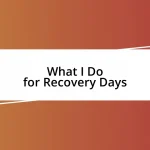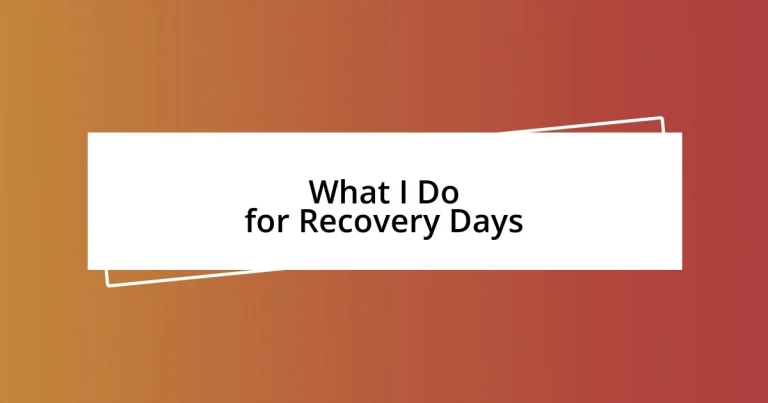Key takeaways:
- Recovery days are vital for enhancing physical and mental resilience, allowing for reflection and rejuvenation.
- A well-rounded recovery routine includes nourishing meals, gentle exercises, mindfulness practices, and adequate rest.
- Tracking progress through habit tracking and emotional reflections helps to enhance awareness and highlight effective recovery strategies.
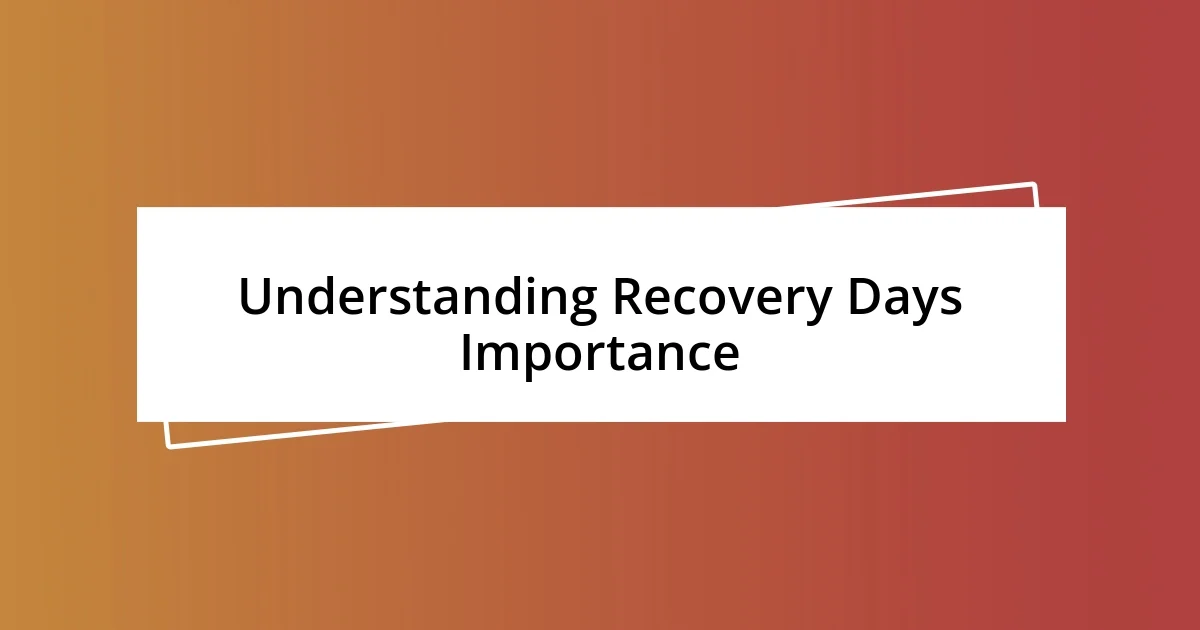
Understanding Recovery Days Importance
Recovery days are essential, as they directly impact performance and overall well-being. I remember a time when I pushed myself too hard, ignoring the signs of fatigue. The result? I ended up feeling drained and unmotivated for weeks. Have you ever felt that way? It’s a common experience, and those days of rest can be the game-changer for both our physical and mental resilience.
Consider how your body works like a finely-tuned machine. Without regular maintenance—think of it as those recovery days—everything can break down. For me, taking a step back to focus on recovery has often led to moments of clarity and creativity. I’d spend a day doing something I loved, like hiking or simply lounging with a book, and return stronger and more energized. Isn’t it fascinating how rest can fuel productivity?
Recovery days also allow us to connect with our emotions and reflect on our journey. I often find myself journaling or meditating during these times. It’s a moment to check in with myself: What have I achieved? What do I need? This practice not only rejuvenates my body but also nourishes my spirit. So, how do you view your own recovery days? Are they a time of guilt, or can they transform into a sanctuary for growth and self-discovery?
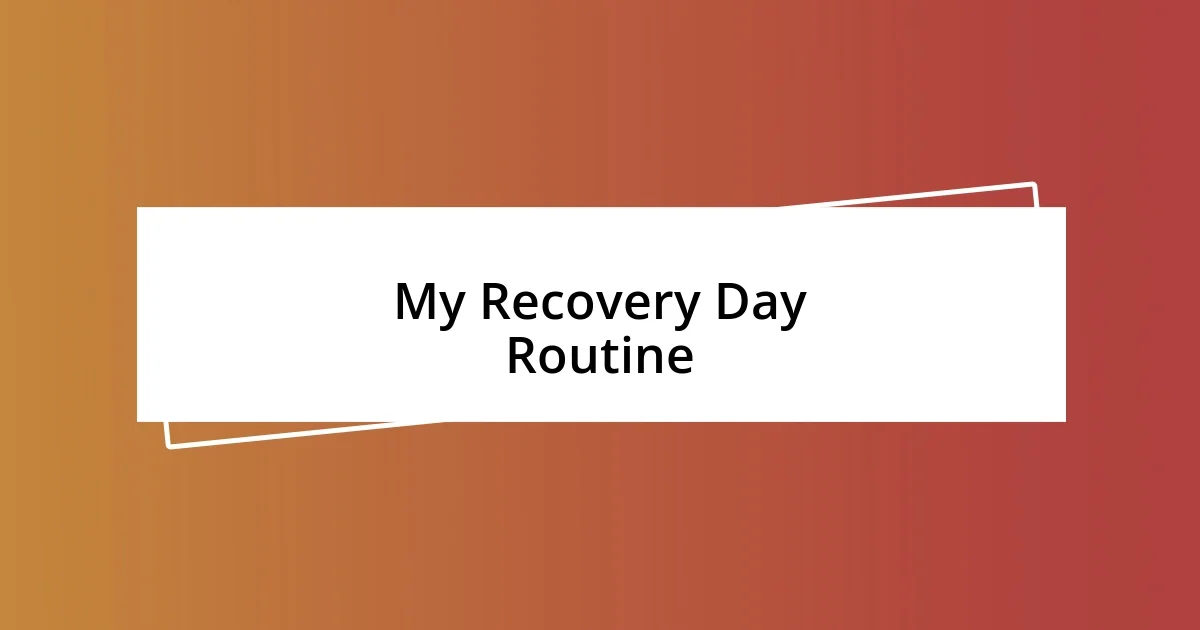
My Recovery Day Routine
For my recovery day routine, I like to start slow and ease into the day. I often wake up without an alarm and make myself a nourishing breakfast, taking the time to enjoy every bite. Recently, I tried some new smoothie recipes that not only tasted great but left me feeling revitalized. It’s amazing how a simple meal can set a positive tone for the rest of the day, right?
I believe in mixing active recovery with some gentle exercises. On many of my days off, you’ll find me engaging in restorative yoga or a leisurely walk at a nearby park. These simple activities help to keep my body moving while allowing it to recover. I vividly remember a day when I spent hours strolling through nature, feeling the sun on my face, and how invigorated I felt afterward. That connection to the outdoors really amplifies my recovery process.
Another essential part of my routine is dedicating time to mindfulness. I often meditate for at least 15 minutes, focusing on my breath and clearing my mind. It’s during these moments that I often receive insights about my life and goals. Have you ever thought how taking just a little time each day can shift your perspective? Personally, I’ve found that regular meditation not only enhances my recovery days but also helps me stay grounded moving forward.
| Activity | Description |
|---|---|
| Breakfast | Nourishing meals to start the day positively. |
| Active Recovery | Engaging in gentle exercises for physical wellness. |
| Mindfulness | Taking time to meditate and reflect. |
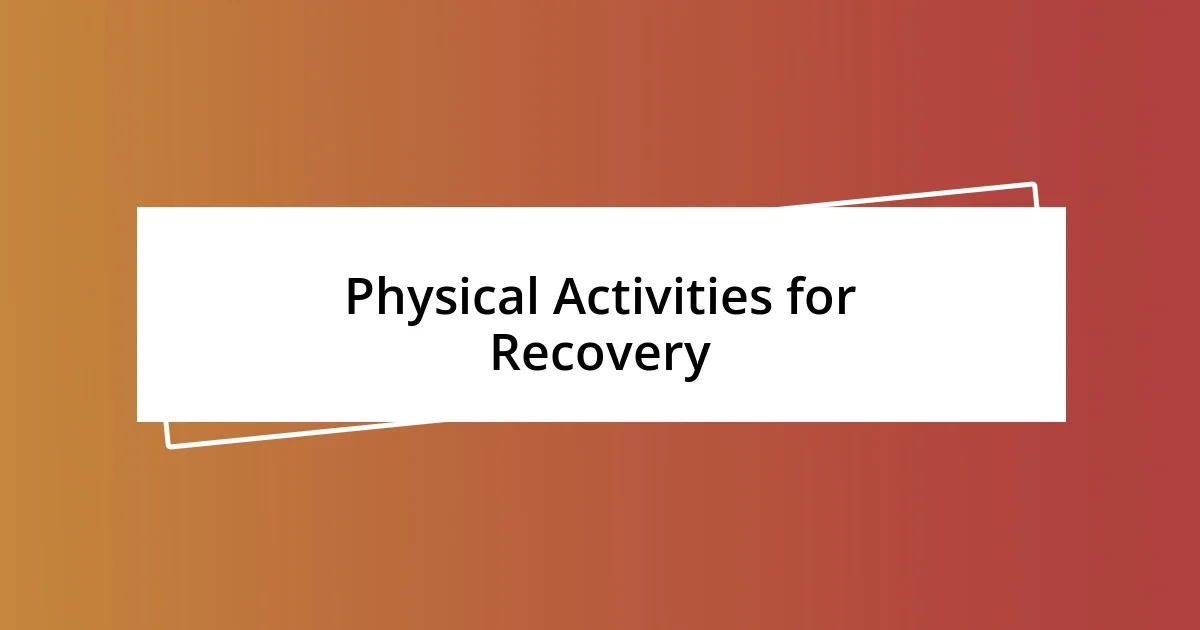
Physical Activities for Recovery
Engaging in the right physical activities during my recovery days is something I’ve come to cherish. I find that low-impact exercises not only help me maintain mobility but also rejuvenate my spirit. One such experience that stands out is when I attended a gentle Pilates class; I felt every stretch resonate deeply within me, washing away the tension I had built up. It’s astonishing how movements that are not pushing your limits can help you feel so revitalized.
Here are some activities I love for recovery:
- Gentle Yoga: A perfect way to stretch and unwind, focusing on breathing.
- Walking: A leisurely stroll in nature can work wonders for my mood.
- Swimming: The soothing weightlessness of water provides a gentle workout without strain.
- Cycling: A short, easy ride lets me enjoy the fresh air while keeping my legs engaged.
- Tai Chi: The slow, fluid movements promote relaxation and concentration.
Every recovery day, I look forward to these activities with a sense of anticipation. It feels good to know that I’m nurturing my body while allowing my mind to recharge. I have often found myself laughing as I try to keep pace with the gentle flow of Tai Chi, reminding me not to take myself too seriously. Embracing these moments of joy and relaxation is both an art and a necessity in my recovery.
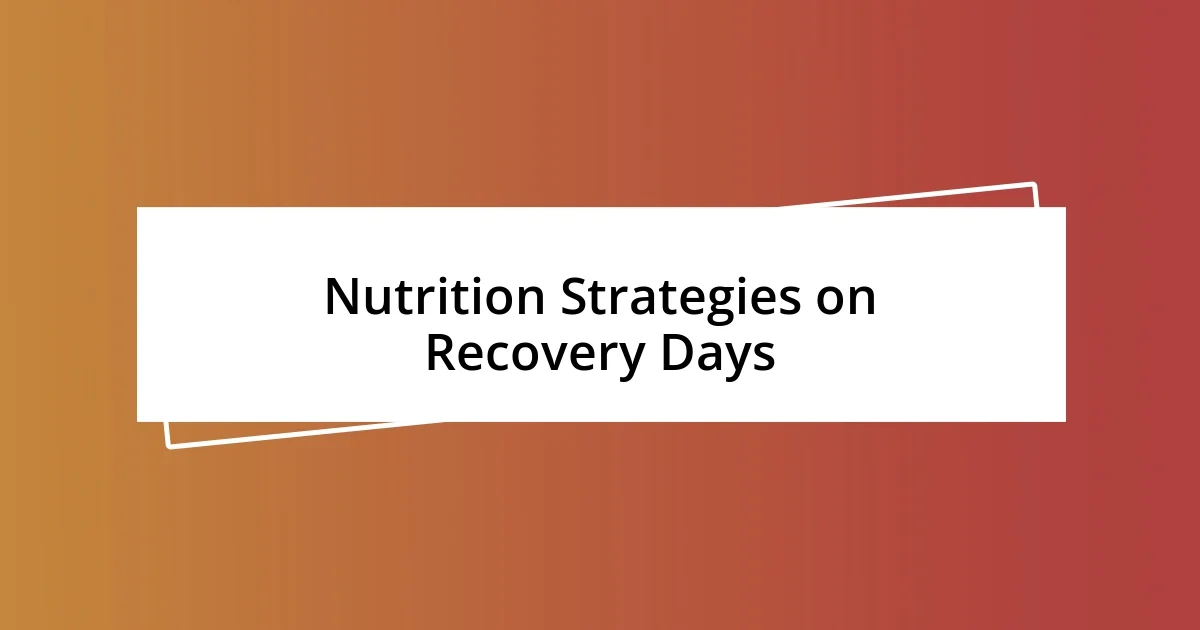
Nutrition Strategies on Recovery Days
When it comes to nutrition on recovery days, I’ve discovered that the quality of my meals plays a significant role in how I feel overall. I often prioritize whole, nutrient-dense foods like leafy greens, lean proteins, and healthy fats. After a particularly challenging workout, I remember treating myself to a hearty quinoa salad topped with avocado and grilled chicken. Not only did it satisfy my hunger, but it also made me feel as if I was honoring my body with every bite. Isn’t it remarkable how nourishing ourselves can elevate our mood and recovery?
Hydration is another key player in my recovery nutrition strategy. I’ve learned to keep a water bottle nearby throughout the day, sometimes adding slices of lemon or cucumber for an extra zing. One afternoon, I realized I felt sluggish and tired, only to find I hadn’t drunk enough water. Once I began sipping more, my energy returned, and I felt lighter and more focused. Have you ever noticed how simply staying hydrated can transform your day?
Additionally, I like to incorporate snacks that support muscle recovery, especially when I’m feeling a bit peckish between meals. Greek yogurt with a handful of berries and a drizzle of honey has become a go-to for me. I fondly recall a time when, after a light workout, I enjoyed this treat while watching the sunset. The combination of sweet and tangy flavors not only quelled my hunger but also turned a simple snack into a moment of joy. It’s these small strategies that truly enhance my recovery days and remind me to savor life’s delicious moments.
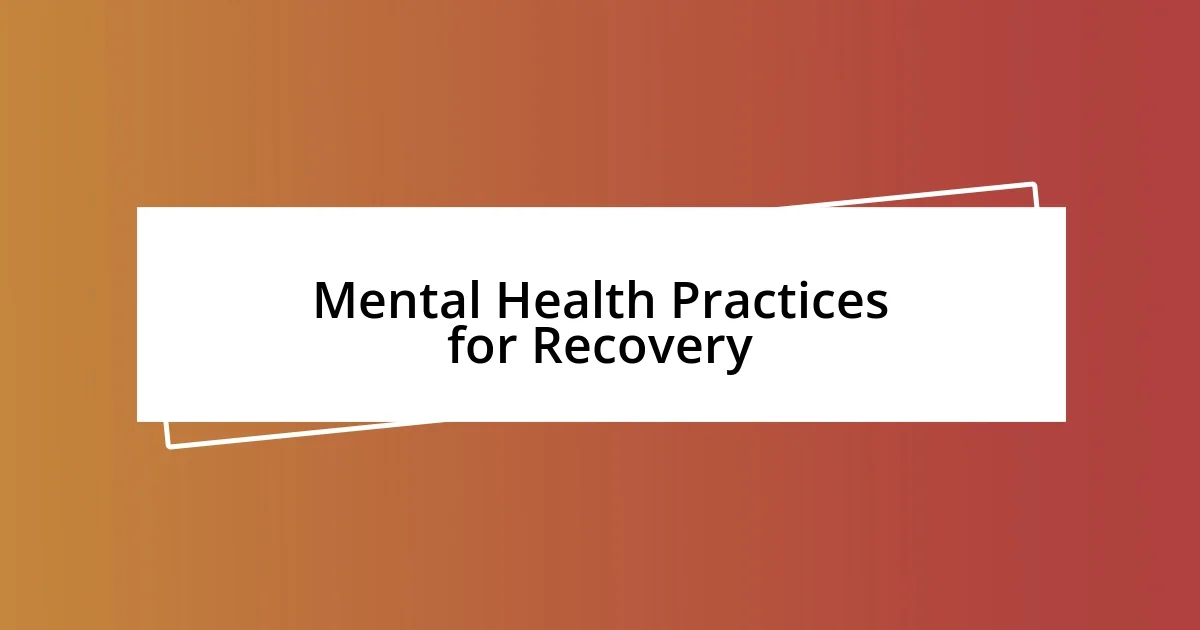
Mental Health Practices for Recovery
Mental health practices during recovery days are just as vital as physical activities and nutrition. I often turn to mindfulness meditation, which has helped me center my thoughts and cultivate a sense of peace. There was a day when I simply sat quietly, focusing on my breath, and although my mind wandered, I gently guided it back, feeling the stress melt away. Isn’t it incredible how just a few minutes of stillness can transform your mental landscape?
Another practice that resonates deeply with me is journaling. I find it therapeutic to pour out my thoughts onto paper, allowing me to reflect on my emotions and experiences. After a particularly overwhelming week, I remember writing about my feelings, and to my surprise, clarity emerged from the chaos. How often do we miss out on understanding ourselves simply because we don’t take the time to pause and reflect?
Engaging in creative activities, like painting or music, also serves as a wonderful outlet for my emotions. I vividly recall a rainy afternoon when I picked up my paintbrush and let colors mix freely on the canvas—it felt liberating to express myself without judgment. These moments not only brighten my day but also remind me how powerful creativity can be in fostering emotional well-being. Have you ever found that immersing yourself in creativity makes everything else fade into the background?
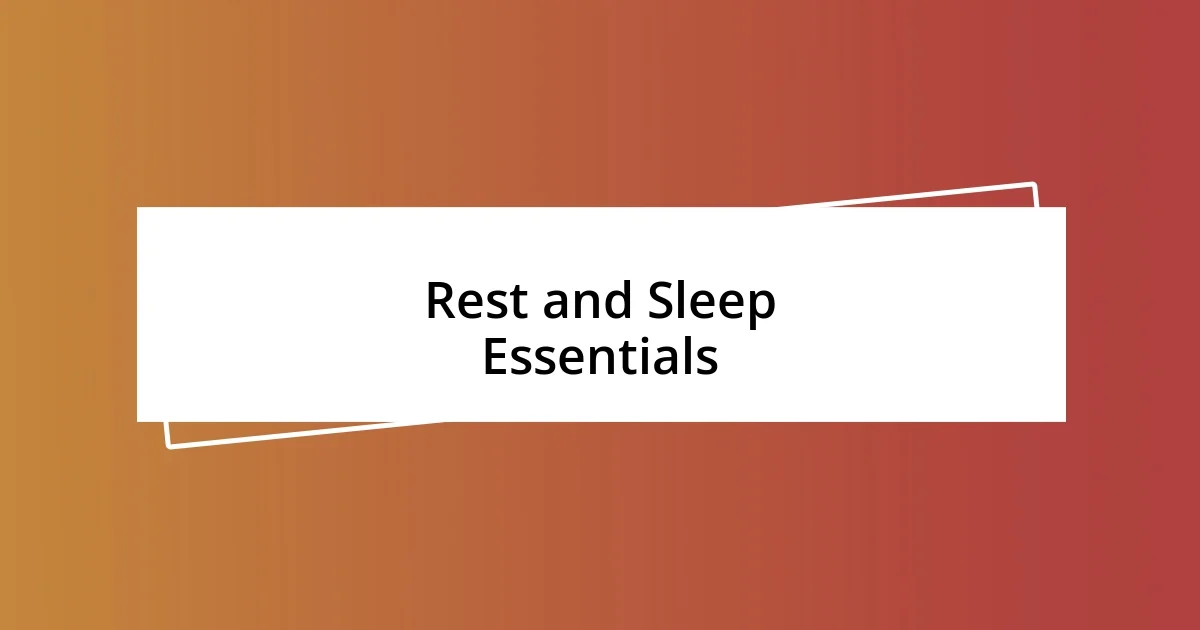
Rest and Sleep Essentials
Rest and sleep are truly non-negotiable components of my recovery days. I prioritize creating a soothing bedtime routine that signals to my body it’s time to wind down. One evening, I dimmed the lights, lit a lavender-scented candle, and cozied up with a good book. That night, I drifted off into a peaceful slumber, realizing how much rituals shape our sleep quality.
I’ve also become more mindful of my sleep environment. A cool, dark room has made a noticeable difference in my rest. I remember a time I opted for blackout curtains after struggling with morning light sneaking in, which used to jolt me awake too early. With that simple adjustment, my sleep has transformed; it feels more restful and rejuvenating. Have you thought about how subtle changes in your surroundings can enhance your sleep experience?
Additionally, I’ve learned the importance of listening to my body’s natural rhythms. There are days when I crave an early bedtime, and those nights grant me the energy I need for the following day. One memorable instance was after a tough week at work when I felt completely drained. Opting to go to bed at 9 PM instead of my usual midnight reset turned my weekend around. This awareness of my own needs has taught me that sometimes, honoring that desire for rest is the best choice I can make. How often do we ignore our body’s signals for more sleep?
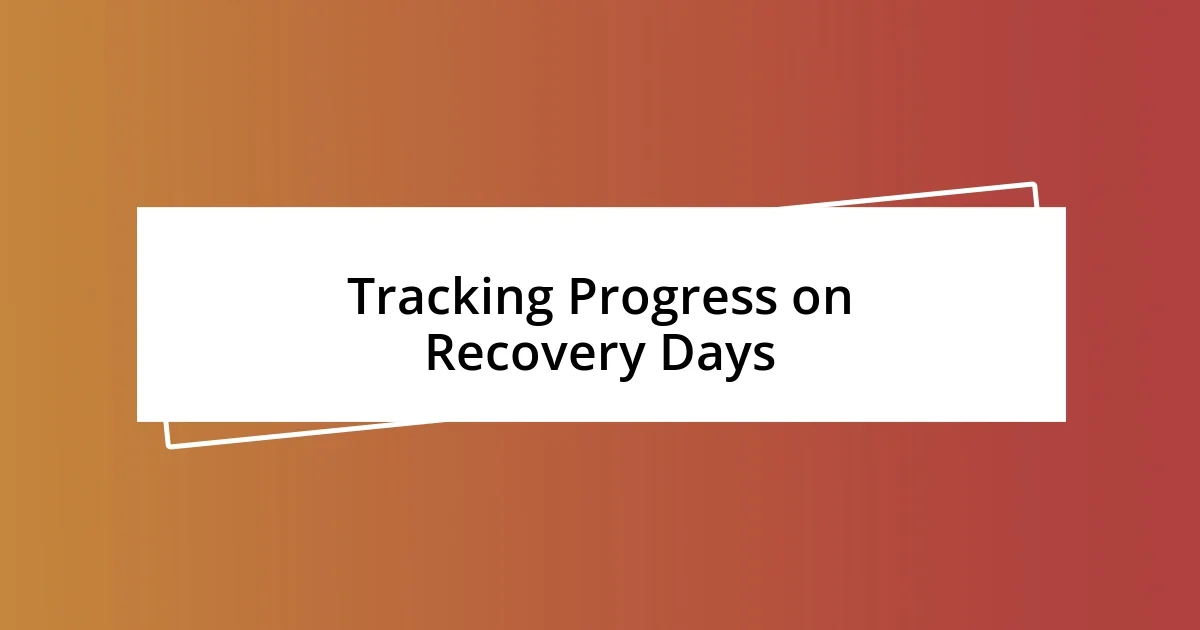
Tracking Progress on Recovery Days
Tracking my progress on recovery days often feels like piecing together a mosaic of well-being. I utilize a simple habit tracker to visually document my daily practices. Each checkmark represents a moment of mindfulness or creativity, and I cherish how each completed task builds a sense of accomplishment. Doesn’t it feel rewarding to see tangible progress in what sometimes feels like an intangible journey?
I’ve discovered that reflecting on my emotional state plays a crucial role in tracking my recovery. There are days when I scribble down how I felt before and after my evening walk. Once, I noted a palpable shift from anxiety to calmness after stepping outside—it’s like a light bulb moment. Have you ever considered how capturing your emotions can illuminate your path to recovery?
Beyond just tracking activities, I find it valuable to categorize my reflections into themes. After several weeks, I noticed a pattern: my mood improved significantly on days I incorporated art into my routine. This revelation was not just insightful; it felt like a validation of my instincts. Who would have thought that creative expression could hold such power in reshaping my emotional landscape?
